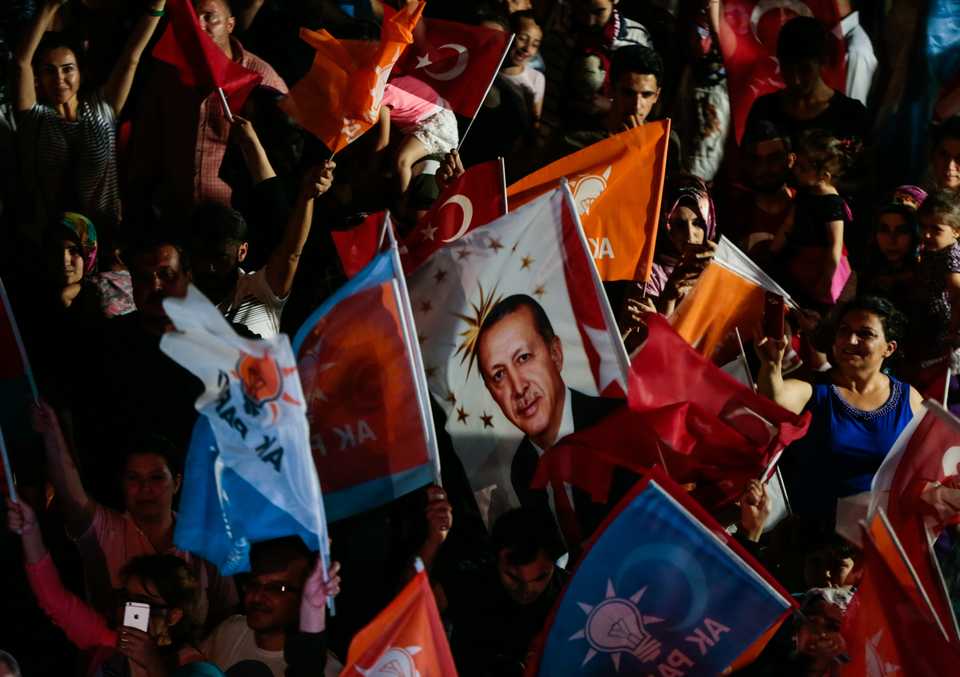President Recep Tayyip Erdogan was leading the polls with more than 97 percent of the votes counted in Turkey’s presidential elections.
Erdogan received 52.6 percent of the vote with his nearest challenger Muharrem Ince of the CHP bagging 30.8 percent of the vote counted so far.
With almost 97 percent of the parliamentary votes counted, the AK Party’s People’s Alliance was ahead with 53.6 percent of the votes and the Nation’s Alliance was in second place with 34.2 percent of the votes.
Celebrations across the country
Supporters of the AK Party in both Turkey and abroad late on Sunday took to the streets to celebrate the victory of their party and leader.
Thousands of people in the capital Ankara and other central provinces of Nevsehir, Kayseri, Sivas, and Nigde and the western provinces of Izmir, Sakarya, and Kocaeli and Black Sea provinces of Zonguldak, Karabuk, and Duzce celebrated Erdogan’s success. Supporters waving both AK Party and Turkish flags.

In addition to Turkish cities, Turks in Brussels, Belgium also celebrated Erdogan’s success.
Celebrations centered on Chaussee de Haecht Street, known as a Turkish district in the Belgian capital.
Poling earlier came to a close in Turkey where people cast their ballots to vote in a new president and parliament.
Voting started at 0500 GMT (8:00am local time) and ended at 1400 GMT (5:00pm local time).
With the polls officially closed, electoral committees across the country’s 81 provinces started counting the ballots in 180,065 polling stations across the country.
Public broadcaster Turkish Radio Television (TRT) said voter turnout on Sunday was high at around 87 percent in Turkey’s presidential and parliamentary elections.
At least 56,322,632 registered voters were eligible to decide on presidential and parliamentary candidates at 180,065 ballot boxes across the country.
By midday, Turkey’s incumbent President Recep Tayyip Erdogan and other presidential candidates had also cast their ballots. These elections will complete Turkey’s transition to a new executive presidential system, a move approved in a referendum in April 2017.
Security forces were deployed throughout the country to make sure the elections are carried out peacefully.
Around 531,007 security personnel, including 264,526 police officers, 195,695 gendarmerie officers, 50,793 village guards and 19,993 voluntary village guards were on duty.
Erdogan cast his vote in a poll station in Istanbul with his wife, the first lady Emine Erdogan.
Erdogan, 64, is seeking re-election for a five-year term and the governing Justice and Development Party, or AKP, is vying to retain its majority in parliament.
Why early elections?
Both parliamentary and presidential polls in Turkey had previously been slated for November 3, 2019.
However, in April, Turkish President Recep Tayyip Erdogan announced elections would be brought forward to June 24.
Erdogan’s announcement came a day after Devlet Bahceli, chairman of the Nationalist Movement Party (MHP) called for early elections to be held on August 26, 2018.
“We were in favour of waiting until November 2019 for the elections. But our military operation in Syria and the historically significant regional developments in Syria and Iraq made it compulsory for Turkey to overcome the uncertainties,” said Erdogan.
“It’s urgent for Turkey to shift to the new system in order to make decisions and take concrete steps regarding our future.”
His rivals, the Republican People’s Party (CHP) candidate Muharrem Ince and the Iyi (Good) Party candidate Meral Aksener, also cast their votes in the cities they had registered in.
Muharrem Ince cast his vote in the city of Yalova.
And Aksener cast her vote in Istanbul, before she travelled to Ankara where she said she would follow election results.
Voting for two
Turkish citizens need to show their ID cards or any other official identification document. It is forbidden to enter the voting booth with cameras or video recorders and mobile phones.
Voters will put two separate ballot papers in the same envelope – one for the presidential and one for the parliamentary elections.
After the voting ends, ballots cast for the presidential candidates will be counted first.
Mobile ballot boxes
For the first time, bedridden voters – more than 17,000 – are being visited at their homes by election officials who will pick up their ballots.
Votes abroad
Some 1.49 million expatriates voted in a 13-day period between June 7-19 at 123 Turkish missions abroad.
Expatriate votes have been brought to Turkey by airmail and they will be counted at the same time as the votes cast in Turkey.
Balloting at customs gates that began on June 7 and will end on June 24.
Election day bans
News media organisations are not allowed to broadcast any political advertising, predictions or comments about the elections until 1500 GMT (6:00pm).
Between 1500 GMT (6:00pm) and 1800 GMT (9:00pm), media outlets will only be able to publish official announcements about the elections issued by Supreme Election Council.
The sale of alcoholic beverages is banned from 0300 GMT (6:00am) to 2100 GMT (00:00pm) while consumption of alcoholic beverages is also prohibited in public places.










Discussion about this post